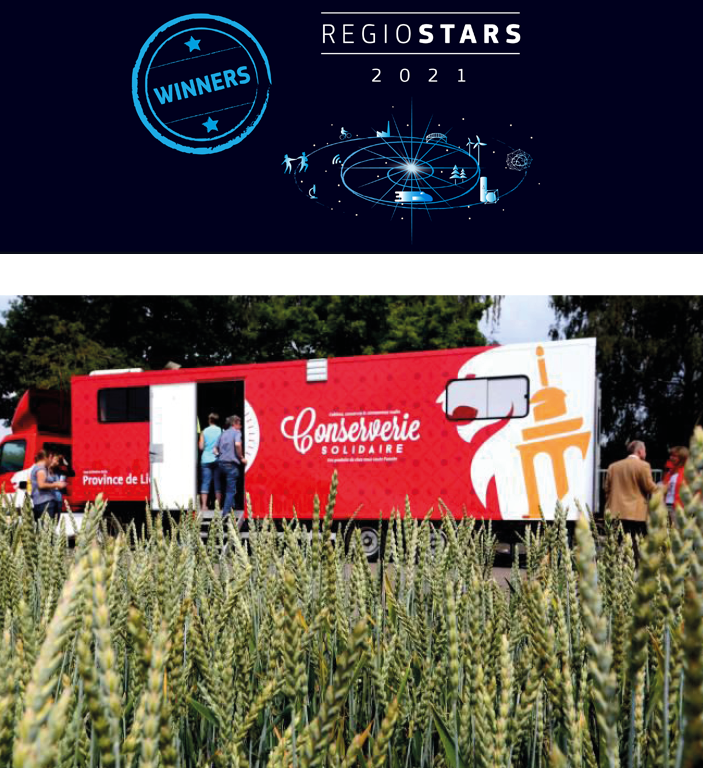The Travelling Solidarity Cannery trains people in Belgium’s Walloon Region in fruit and vegetable processing, conservation and packaging techniques. It supports the growth of economic initiatives centred on production, distribution and marketing of local and seasonal products, as well as the use of unsold supermarket food and surplus from harvests. Known as ‘short circuits’, these initiatives create non-relocatable jobs within a sustainable local economy, prevent waste and provide healthy, affordable food for disadvantaged people all year round.
- 30 September 2021
The Travelling Solidarity Cannery is a social innovation system of training in fruit and vegetable processing, conservation and packaging techniques. It is intended for people seeking new skills or retraining in emerging professions related to developing short circuits and healthy and sustainable food.
Comprising four modules, the training covers fruit and vegetable processing and preservation, techniques for animating processing and preservation workshops, hygiene rules and traceability in canning factories, and traceability and logistics.
More than 700 people have taken part, 68 % of them women. Participants include people experiencing isolation, job seekers, employees, the self-employed, people wanting to retrain and trainers working in green jobs or community kitchens. Three quarters of the trainees come from the Province of Liège; the rest from elsewhere in the Walloon Region.
The cannery has led to the creation of about 12 short circuits. They include initiatives in areas ranging from herbalism to the manufacture of baby food jars, and the setting up of a food production truck.
An urban-rural link
Training takes place in a specially adapted truck which visits urban and rural areas. This strengthens links between cities and the countryside by enabling city dwellers to develop skills that are often seen as exclusively rural.
Much of the food preserved by the trainees is grown where the courses take place, such as in around 10 community gardens. In this way, the project cuts CO2 emissions from transport. Further environmental benefits come from its efforts to discourage overproduction, which prevent the destruction of food and resulting emissions. Also, by teaching trainees how to use fruit and vegetable offcuts and tops when preparing food at home, the project saves them money.
The fact that the cannery is mobile fosters social inclusion by making it easier to reach vulnerable people and brings diverse groups together around a common theme. It also means that activities can be implemented in places with no training facilities.
Theoretical and practical work
With a duration of 30 hours, the module on fruit and vegetable processing and preservation allows participants to learn about hygiene rules in processing workshops before applying preservation methods themselves. Also providing 30 hours of training, the workshop animation module includes theory and practical food preservation training.
Mainly aimed at professionals or people developing food production projects, the module on hygiene and traceability in canning factories runs for 12 hours and is entirely theoretical. Participants learn how to set up processing workshops in line with relevant standards.
The traceability and food logistics module comprises 8 hours of theoretical and practical training on hygiene during transport and storage of food and traceability requirements.
For many consumers, the Covid-19 pandemic has increased the attraction of local produce and small-scale cultivation methods. Since mid-2020, this has been reflected in growing enthusiasm for the Travelling Solidarity Cannery and willingness to market its products.
Beneficiaries
‘To complete my domestic experience of fruit and vegetable preservation, I participated in the ‘professionalising’ modules on hygiene, traceability and logistics at the Solidarity Cannery. This gave me the confidence to create the ‘Les Bocaux du Warichet’ non-profit association, which has since received a subsidy from the Walloon Region for the creation of a local, inclusive cannery.’
Céline Henriet, founder, Les Bocaux du Warichet asbl
‘Following a burnout, I decided to redirect my professional life. Working in the early childhood and nutrition sectors, I put my two jobs together and came up with the idea of manufacturing baby food jars. I didn't have any knowledge of preservation methods or hygiene. This training answered my questions and I started making baby food jars. I now work in collaboration with a cooperative that has helped me get this new project underway.’
Anne Wallon, founder, Les p’tits potes baby food project
Total investment and EU funding
Total investment for the project “The Travelling Solidarity Cannery” is EUR 1 633 201 with the EU’s European Social Fund contributing EUR 711 073 through the “Wallonie-Bruxelles 2020.eu” Operational Programme for the 2014-2020 programming period.

